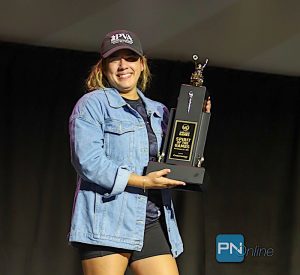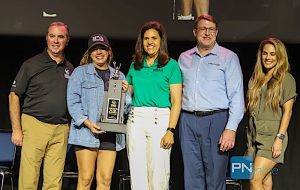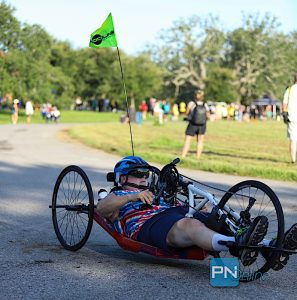Celebrating Service and Sport: Wheelchair Games End on High Note
Veterans, their families and friends converged without restrictions, marking a triumphant return to the full spirit of the Games.
The bustling streets of New Orleans set the stage for this long-awaited gathering, where the clatter of wheels and the sound of laughter echoed the resilience and determination that define these amazing veterans. And as the sun rose on the final day of competition, the Big Easy embraced a celebration of service, sport, and unwavering human spirit.
Keyla Agosto wins Spirit of the Games award
It was all hugs, happy tears and lots of smiles for Paralyzed Veterans of America (PVA) Puerto Rico Chapter member Keyla Agosto Tuesday night, as she was announced as the 43rd National Veterans Wheelchair Games’ (NVWG) Spirit of the Games award winner during the closing ceremony at the Ernest N. Morial Convention Center in New Orleans.

As the Army veteran made her way up to the stage to accept her trophy, her teammates sang in Spanish, saying she was a “boricua,” or native Puerto Rican.
The 34-year-old Bayamon, Puerto Rico, resident, who has multiple sclerosis and has competed in the Games for three years, says she was surprised by the honor. But she always wants to make people smile.
“You think when you do stuff like this nobody sees what you are doing. And now, I feel surprised because a lot of people see when I have a happy spirit,” she says. “But, at the same time, it’s the first year my husband [Hector] has not been here.”
She says she believes she was selected because of her spirit.
“Because I think I have the spirit to try and make people happy,” she says. “And I’m always smiling. And sometimes people think like I’m fake and I’m not. I wake up with a smile and go to sleep with a smile. Like, it’s my personality.”

Agosto, who is the third PVA Puerto Rico Chapter member to win the award and first Puerto Rican female, urges other veterans with disabilities to get out and find their passion.
“Because sports change your life,” she says. “I know not everyone loves sports, but maybe they love school, or they have to do whatever they want to. And don’t think they cannot do stuff. Like, they just have to do it.”
Started in 1987, the Spirit of the Games award honors the NVWG athlete who best exemplifies athletic performance, sportsmanship and good character. Winners are nominated by their peers. Additionally, Agosto receives a $2,000 flight voucher to a U.S. destination of her choice and complimentary travel and lodging for the 2025 NVWG in Minneapolis, courtesy of First Nation Group.
Handcyclers Race At City Park
Wheelchair athletes began the final day of National Veterans Wheelchair Games competition Wednesday with handcycling at City Park in New Orleans.
Fifty-six registered riders completed six laps around the Festival Grounds for 10 kilometers total.
One of those riders was Army veteran and PVA Colonial Chapter member Bryan McCrickerd, who added one more gold medal to his collection after finishing with a time of 23 minutes and 7 seconds in the Masters IV division.

It wasn’t about winning a medal for the 60-year-old Bethlehem, Pa., resident, though.
“The only thing I was looking forward to was finishing,” McCrickerd says. “That’s all I ever do is hope to finish and try to do better. If I don’t medal, I’ve got enough on my wall at home. I don’t need more. They just collect dust. I found a long time ago that medals don’t matter. Just finishing. If I don’t finish it, it hurts me.”
McCrickerd, who served from 1983 to 1989 and sustained level L3-5 and S1 incomplete spinal-cord injuries from wear and tear on his back during his time in the military, says he improved his time from previous years, but he still has a long way to go. He’s competed in handcycling at the NVWG since 2018 and says he trains two or three times a month.
“Not as much as I should, but with all the other sports, I don’t have a lot of time,” he says.
He also competed in air rifle, air pistol, archery, bowling, disc golf and cornhole. He says sports help his mental status and his attitude, and he says his favorite sport is “the one I’m doing.”
Cornhole Champs
Making its debut as a medal sport, cornhole gave athletes a new challenge.
Athletes in paraplegic and quadriplegic divisions were randomly paired for the popular lawn game, which involves tossing bean bags from a distance of 12 feet, 16 feet or 20 feet (depending on the athlete’s injury level) into a 6-inch-diameter hole cut into an angled board. A bag in the hole scored three points and a bag on the board scored one point. The first team to go over 21 points won the round, and the best two out of three rounds won the match.

Gabriel dias de Leon and Edward Younger teamed up in the cornhole finals to win gold in the quadriplegic division, beating Jesse Graham and Richard Spizzirri.
Army veteran and PVA Texas Chapter member de Leon served from 1982 to 1984 and sustained a level C5-7 SCI during a convoy escort in 1984 when his Jeep was shot, causing the driver to lose control, flipping the Jeep and throwing him from it. The 61-year-old wanted to compete in cornhole because it was something different to do indoors.
“I was blessed by having a really good partner. It’s the luck of the draw. I just got really lucky,” he says. “I have a little more function than he [Edward] does, but he was able to keep it on the board and give us points. Some of the other participants we played against, one person was good and the other person was not as good, so luckily we kind of complemented each other.”
De Leon bought a cornhole board for his yard and has been practicing for a couple months. He says his strategy was not allowing Graham to have easy access to the hole.
“You know, Jesse is a pretty good player. I was just trying to block the hole because he would just slide them in really easily,” de Leon says. “So, if I blocked the hole, he’s having to go over the top, and he had trouble doing that.”
Meanwhile, Navy veteran and PVA Lone Star Chapter member Clinton Adger teamed up with Rory Cooper against Joe Wittcamp and Frederick Dunlap to win cornhole gold in the paraplegic division.
“It feels really good because I thought I’d just come out here and do some networking and find out what I really liked,” says Adger, a 43-year-old Dallas resident, who served from 2000 to 2005 and has a level T5 SCI from multiple myeloma, a type of cancer. “Cornhole, I didn’t think I was going to medal in cornhole, but I like to play it, so it was good to actually come out here and win.”
He says he’s worked on strengthening his mind as well as his and used meditation to help him stay focused.
“If just sat there and looked at the board just a little bit, I was clearing my mind and I was doing some meditation breathing. It actually worked. It’s crazy,” Adger says.
He enjoyed the chance to interact with people like Cooper.
“When he came up short, I was there, and when I came up short, he was there. He carried the team all by himself,” Adger says.
Anderson, York Capture Pickleball Final
Army veteran and PVA Vaughan Chapter member Roosevelt “RJ” Anderson Jr., paired with Robert York to bounce Marco Bungert and Justin Hall in the pickleball finals.
Anderson, who served from 2008 to 2014 and sustained a level T4/T5 SCI in a 2012 motorcycle accident, says he didn’t expect to come away with the gold medal in pickleball. The pair won two of three matches.
“We only won by one point the first game,” Anderson says. “The second game, we blew it away. But the first game we only won by one point, so that was really close. That was a nail-biter.”
The 42-year-old Chicago resident wasn’t originally registered to play, but he filled in for someone who had to drop out. It marked the first time he’d played pickleball against other wheelchair users.
“It’s crazy because I don’t play against wheelchairs, I play against able-bodied. So, it was very cool to be able to play against chairs and have a very competitive match,” Anderson says.
He says he stayed mellow-minded and enjoyed being on the court with other veterans.
“Most of all, I had a blast. I just had fun, and I think that’s why I actually played well because I was just having fun,” Anderson says. “Good teammate. Playing against vets across the net. I wasn’t overly competitive.”
Gold For Team Cocodrie
In the wheelchair rugby final, Team Cocodrie narrowly beat Team Bienvenue, 44-42. Army veteran and PVA Gateway Chapter member Bill Lytton says attitude and persistence gave his team the win.
“Lose the ball, you just pick up and go to the next play and keep moving,” he says.
The 60-year-old Kansas City, Mo., resident, who served from 1986 to 1988 and sustained a level C6-7 SCI in a 1987 car accident, scored the final try to seal the game with under a minute remaining.
Lytton says it felt great to win gold in his seventh time playing at the Games.
“It was a good game. It was close. We were matched pretty even,” Lytton says. “Playing here is always for fun. It’s great when you get the gold, but it’s for fun. Giving the guys who only play once a year or have very limited experience the opportunity to get out here on the court and play, that’s the true objective to let everybody have fun and just enjoy.”
Lytton, who plays for the Kansas City Revolution wheelchair rugby team, says Team Cocodrie’s strategy was to keep the high-pointers as much out of the play as possible when they inbounded the ball.
“That way they’d have to inbound with the low-pointers who have less function in their hands,” he says. “As a team, I think we stuck to our strategy. We communicated … which always helps to win a game. Communication is always the key, like in life.”








